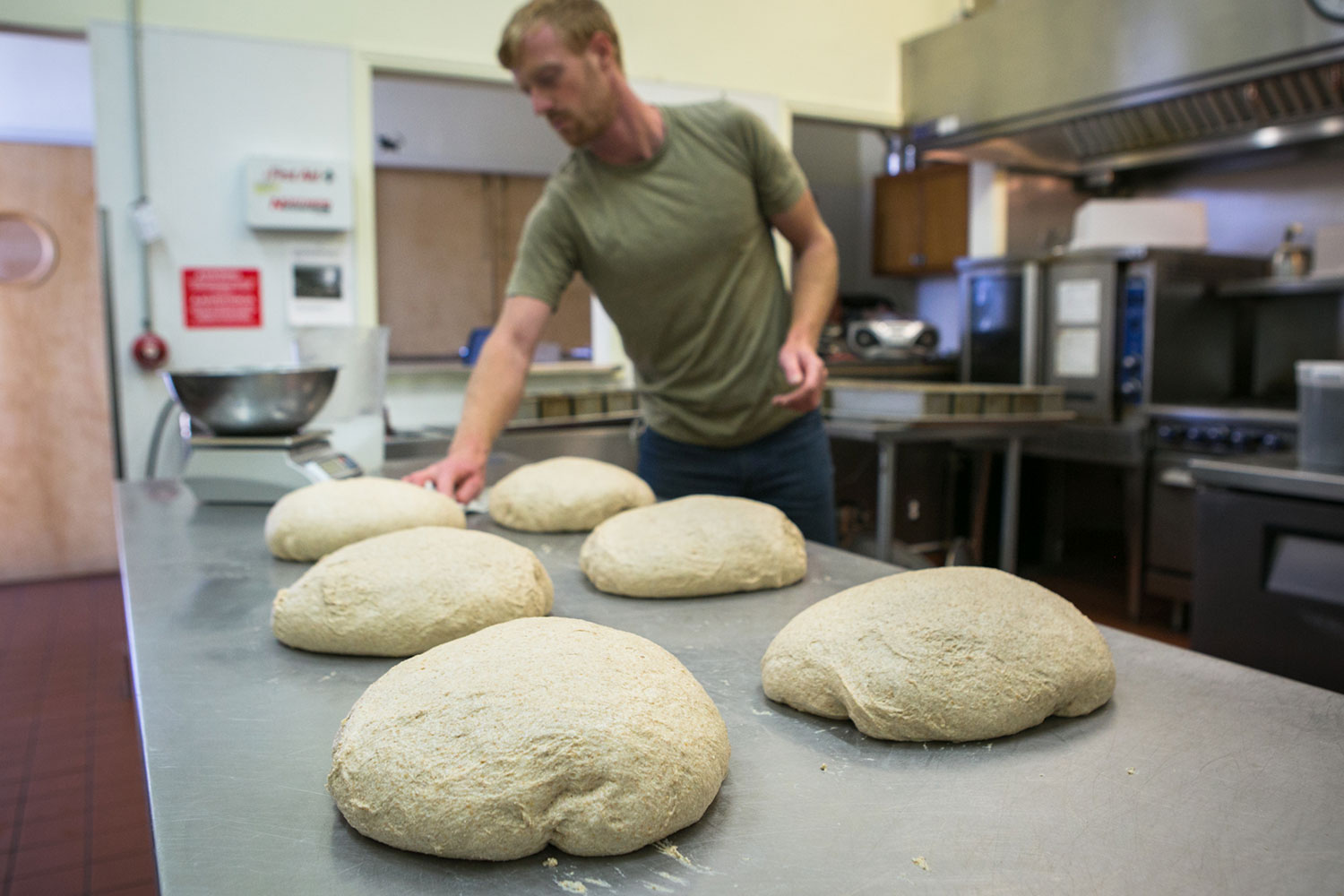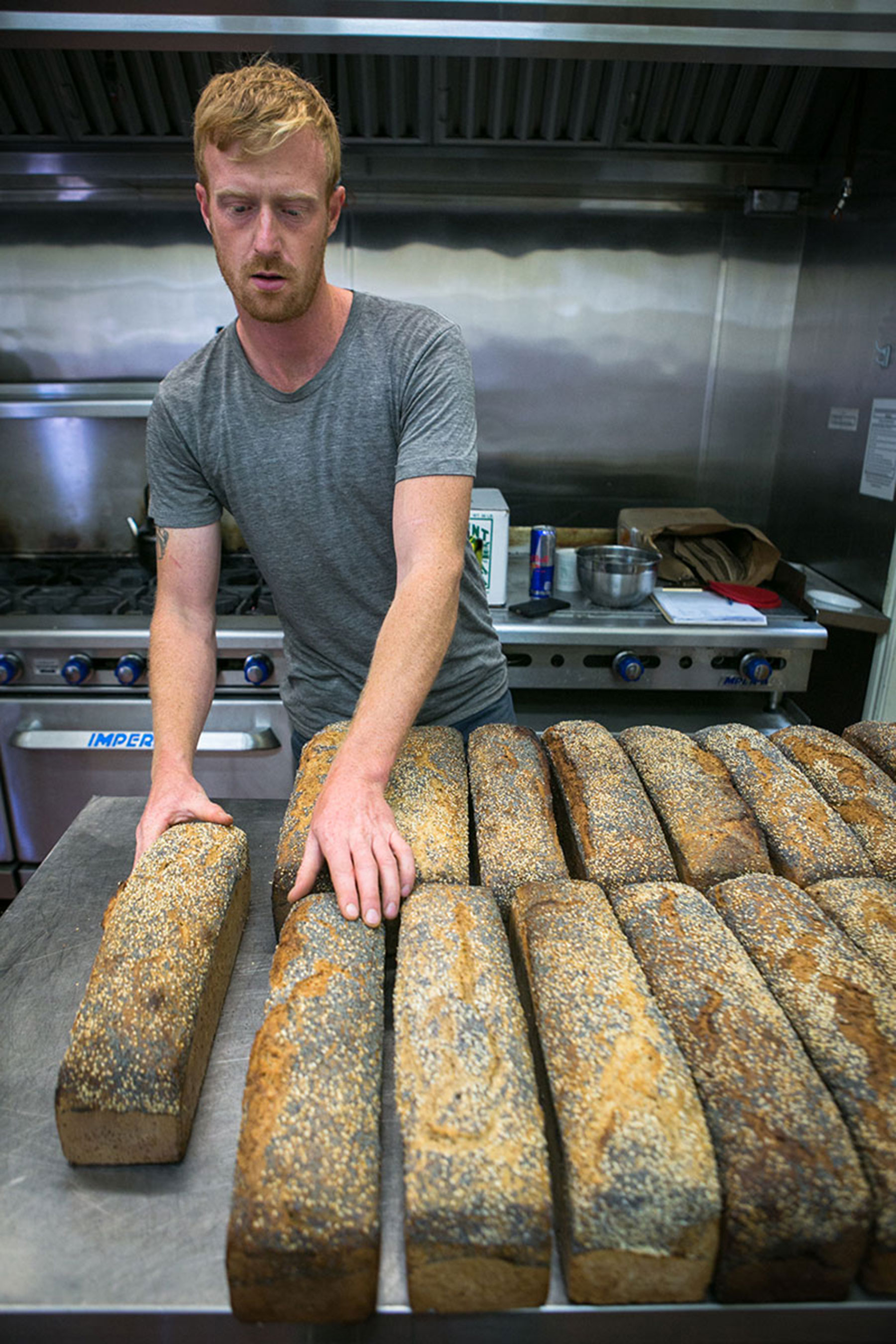Eliot’s Bread

A Former Beer Brewer Turned Farmer Bakes Old-School Style
by Holly Madrigal
photos by Bobby Cochran
There is an alchemy created when ancient grain, water, salt and natural yeasts combine to make a delicious loaf of bread. Building his own sourdough starter from scratch about three years ago, Eliot Hartley let the combination of organic rye flour, water, and naturally occurring microbes transform into a lively bread base. This starter now goes into all of Eliot’s sourdough bread, which he prepares and bakes at the Little Lake Grange kitchen and sells at the Willits Farmers Market. “I used to work as a commercial beer brewer,” says Eliot. “It’s a very similar process, the fermentation. I always had an interest in it and I did it as a hobby. I wanted to make bread for myself, and the next level is sharing with other people.”
Eliot is largely self-taught. His sister is a baker, some bakers have helped him along the way, and he lived with a pastry chef for a time, learning a lot from her. He jokes that there is lots of information about how to bake with refined bread flour. The challenge was to develop a tasty, light loaf without as much readily available gluten. “I don’t want to be adding lots of extraneous things to my recipe. I really just want flour, water, grain, salt. It’s a unique process to make whole grain bread, and to make it taste good.”
Eliot focuses on using ancient grains and heirloom varieties like kamut, Khorasan wheat, and spelt. The spelt has enough gluten to make a delicious hearty loaf with really good flavor. The bread has a savory tang from the sourdough and a crisp-crunchy crust. He buys grains whole from an organic distributor in Petaluma and grinds it fresh prior to baking. Last year, he tried growing about an acre of rye with advice from local grain entrepreneur Doug Mosel. They harvested the acre, but it turns out that it is not feasible right now to grow the amount of grain needed for his bread production.
While living in the area, Eliot decided to enroll in the School of Adaptive Agriculture program located at Ridgewood Ranch just south of Willits. The school has a vocational instruction curriculum that is training the next generation of farmers in the science and art of producing food. Through his work at the School of Adaptive Agriculture, he met others with a similar desire to make a difference producing good, clean food using sustainable principles.
This group of like-minded individuals formed The New Agrarian Collective, which is now producing many of the staples of life from a diverse collection of sustainable businesses based at Ridgewood Ranch. Eliot and his partners in the collective are part of an exciting wave of young farmers practicing old traditions and adapting them to the current food culture. The value of good food—the kind where you know who grew, tended, and produced it—is hard to quantify. The New Agrarians are striving to create this food within an integrated farming system, while balancing their sanity in the process.
Most of the collective live on Ridgewood Ranch and continue to farm there. They chose the collective model to take advantage of shared branding and shared work, but also for the ability to take time off from farming. These young farmers have learned that their work is often very demanding, every day of the year. The physical and financial stresses can lead to burn-out. The idea behind the collective is that the members of the group can support one another, maybe even leading to that elusive farmer dream, a day off. All the parties support each other, which allows them to sell meat, vegetables, eggs, wool, and Eliot’s Bread at the market.
There are seven members of the collective, each with different roles and self-run businesses that fall under the collective umbrella. Joshua Sternberg manages vegetable production with Caroline Reyberger as farm manager. Jes and Keith have Butter Cup Compost Lab. The other members of the collective contribute to the compost from the crop waste and bedding collected from the animals. The compost, in turn, creates fertility in the farm operations. Caroline Radice works with the farming business and Ruthie King and Eliot handle the animals. This year they have raised about 30 pigs, and 40 or so sheep for processing. The two manage a flock of a couple hundred egg laying hens. Ruthie also leads the sheep shearing operation.
“Trying to balance my baking and the livestock operation, there are times when I really can’t step away from the farm. And when you are providing a staple food, like bread, people notice if you are not at the market,” he adds. “People are disappointed, but they understand if I let them know that I didn’t make it to market because we were lambing this week,” he laughs. Hopefully, the collective model will allow increased flexibility as time goes on.
Eliot Hartley sells his bread at the Willits Farmers Market. Look for more about the New Agrarian Collective on their Facebook Page and in an upcoming article. Buy their pork, eggs, vegetables, and wool at the Willits Market, Thursdays 3:00-5:30 in the winter location, the Little Lake Grange, 291 School Street.
Holly Madrigal is a Mendocino County maven who loves to share the delights of our region. She’s fortunate to enjoy her meaningful work at the Community Foundation and takes great joy in publishing this magazine.



